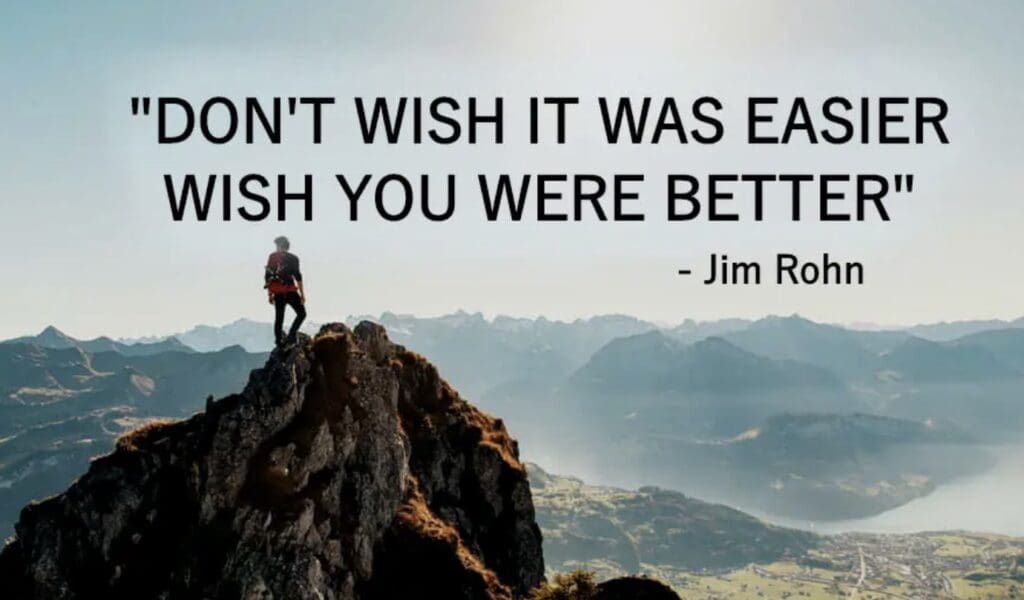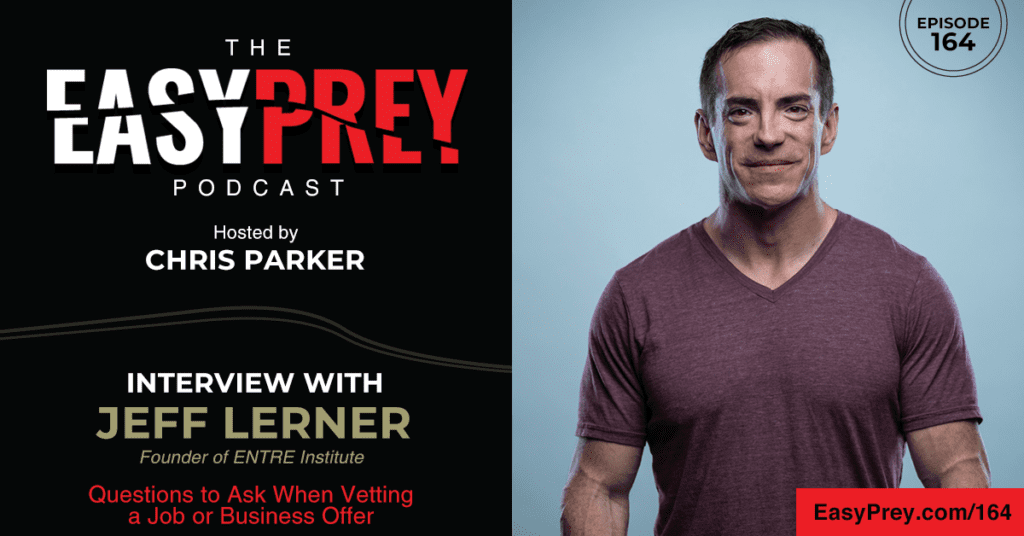
Business opportunities can entice you to believe that you can make large amounts of money in a short period of time. It’s important to verify proof of their claims before joining and knowing how to research this can save you time and money.
Today’s guest is Jeff Lerner. Jeff is a five time Inc. 5000 CEO with over $100 million in sales. In 2019, he founded Entre Institute, the world’s first institute of higher learning for entrepreneurs which is now one of the fastest growing education and technology companies in the world.
“If you understand the mechanics of business, you'll see through the smoke screen. If not, you’ll be enticed by the smoke screen.” - Jeff Lerner Share on XShow Notes:

- [1:12] – Jeff shares his background as an entrepreneur and the creation of Entre Institute.
- [3:26] – When you do the entrepreneurship work legitimately, it can be very lucrative.
- [6:18] – The way people work in their chosen industry works a lot differently in this generation than it did in the past, with people changing companies often.
- [9:25] – There are four ways to earn money in the entrepreneurial industry.
- [11:25] – Jeff thinks about the current economy as wilderness. The key is to have a guide and a map.
- [12:57] – The number one thing when vetting opportunities is to verify social proof.
- [15:10] – The responsibility is on the provider of the opportunity, but vetting them is on you.
- [17:29] – If you understand the mechanics of business, you'll see through the smoke screen. If not, you’ll be enticed by the smoke screen.
- [21:49] – There are a lot of people who are coming from a place of desperation who will say whatever needs to be said to bring in an income.
- [24:00] – How do you know the right questions to ask?
- [26:44] – There are job scams and business opportunity scams.
- [27:39] – If you are offered a commission but it’s not a sales job, question what you are being asked to do.
- [29:12] – You should never have to spend money to make money in a legitimate business opportunity.
- [31:42] – It’s okay to have a level of attractive compensation as long as it is coupled with skills needed to realistically bring in that amount.
- [35:10] – A lot of people feel very discouraged and frustrated with the management of the economy and entrepreneurship sounds appealing.
- [38:20] – There are a lot of amazing stories of people making tons of money with few skills, but they are few and far between.
- [41:14] – Nothing worthwhile is easy. If you embrace getting better rather than things being easier, you will be scam proof.
Thanks for joining us on Easy Prey. Be sure to subscribe to our podcast on iTunes and leave a nice review.
Links and Resources:
- Podcast Web Page
- Facebook Page
- whatismyipaddress.com
- Easy Prey on Instagram
- Easy Prey on Twitter
- Easy Prey on LinkedIn
- Easy Prey on YouTube
- Easy Prey on Pinterest
- Jeff Lerner on YouTube
- ENTRE Institute Website
Transcript:
Jeff, thank you so much for coming on the Easy Prey Podcast today.
My pleasure. I am glad to be here, and this is a conversation that I'm excited to have.
Me too. Let’s get a little background out of the way. Can you tell the audience who you are and what you do?
My name is Jeff Lerner. I spend most of my day as the CEO of an online entrepreneurial education platform called ENTRE Institute. We’ve been in business for about four years. Prior to that I have been an entrepreneur literally since I was 16 years old. I actually dropped out of high school. I was also a working jazz musician all through my 20s, so I was a full-time musician, part-time entrepreneur all through my 20s.

I started lots of different businesses. Never had much money, never had much success. I actually failed almost a dozen of them in my 20s, different entrepreneurial ventures. In the late 2000s, about 2008 or 2009, I got involved in online marketing and had a considerable amount of success, which was really good because I was also $500,000 in debt from those more traditional business failures. I actually had enough success that I was able to pay off that debt. Never declared bankruptcy.
I actually swam my way back up to the surface, so to speak. I've basically been doing, ever since 2009, a number of different, either online or hybrid, physical-digital businesses, really leveraging what I call the modern economy and the modern opportunity of entrepreneurship. I did affiliate marketing for several years. I had a digital agency and provided marketing agency services for small to medium-sized businesses all around the United States and Canada. I did that for about five years.
I had an online training company that was actually a direct sales company for two years. That actually overlapped with the agency. But then in 2018, I shut down the direct sale trading company and I sold the agency. I had a nice exit. I was basically 39 years old and retired.
A nice place to be.
Yeah, and bear in mind, that’s having been a high school dropout turned jazz musician. In the traditional book of how to be successful, I did nothing that you're supposed to do. I dropped out. I became a musician. I followed my creative passions and failed at 11 different businesses. I didn’t do anything right except I was 39 and I was retired, because of the power of legitimate modern entrepreneurship, some of the stuff that you talk about what’s legit and what isn’t. When you do it legit, amazing things can happen in your life.
In the traditional book of how to be successful, I did nothing that you're supposed to do. I dropped out. I became a musician. I followed my creative passions and failed at 11 different businesses. -Jeff Lerner Share on XIt was 2018, I sold my agency, shut down my other business and I'm like, “What do I do now? I'm not actually going to retire. I’ll just go nuts. I don’t really like to golf.” I ended up starting to put out content on the internet teaching people about the opportunities of the modern economy. Also, really what I'm passionate about, I'm actually deeply passionate about psychology, personal development, communication theory and how to really level up all areas of your life through the way that we interact with the world.
I started putting out content that tried to fuse together the entrepreneurial, more business-focused aspect of what’s possible in the world but coupled that with a real, true grounding and personal development, and who do you need to become in order to go become a successful entrepreneur in the modern world. That novel fusion of subjects really struck a chord with people and my content started getting shared a lot. Within a year, I realized I've really got something here in terms of a potentially viable business. An actual training business of teaching people how to take advantage of the new economy.
In the summer of 2019, we actually created a course, and that course has now been purchased by about 275,000 people. We’ve created a bunch of more courses. We have software. We have coaching programs. We have live personal development events. Essentially ENTRE Institute is growing into one of the largest platforms in the world that teaches people how to go out into the modern world and create a business or learn monetized skills that allow them to create the life they want now, rather than the old model, which says, “We’ll spend 40 years trading your time for money in some traditional job and then maybe you'll be able to retire someday and have the life you want once you're potentially too old to really enjoy it much.” I think you can have it now if you understand how the economy works. That’s what we teach.

It’s interesting. I think you and I are around the same age. How you start a business and what work life looks like has changed a lot since we were entering the job market. For our parents, it was you work 40 or 50 years at the same job and you retire. For people of our generation, it’s maybe work for 10 or 15 years and then you switch companies and you stay in the same industry. You just do 10 years, 20 years. 10 years, 20 years and you're done.
Well, the average person now actually changes jobs more than every two years. I think the average job tenure now is 22 months.
To me, that’s crazy from when I started working. It was that you are an irresponsible, messed up person if you can't stay somewhere 10 years.
In ENTRE, we’ve scaled really fast, we just probably hired 120 people in the last two years or so. I've seen a lot of resumes and it doesn’t really matter. If you're talking about entry-level positions or senior executive positions, every resume now has 10 or 12 job history items on it. It's crazy.
The other thing was, I remember when I started a full-time real job, it was if we find out what you're doing on the side, even if it’s an unrelated industry, we’re terminating your employment immediately. It’s so funny now, almost all employers—like it’s part of the interview process is like, “What are you doing on the side?”
Yeah. I think some of that is a shift in mindset. I think some of that is also an economic reality. If employers are going to try to keep their employees from making extra money, then they need to pay them enough to live in the modern world. I think they’ll take the cheaper option.
If employers are going to try to keep their employees from making extra money, then they need to pay them enough to live in the modern world. I think they’ll take the cheaper option. -Jeff Lerner Share on XYeah. There’s been some massive rise in the gig economy, people deciding, “I don’t want to work 40 hours a week for one person. I want to set my own schedule, do my own thing.” Then this little thing called COVID happened and everyone had to start working from home in one respect or another. There was a massive rise, not just in people working for the gig economy but the opportunities there, I think, have exploded.
You have lots of people that are starting businesses that’s like, “I can't afford someone full time, and this whole gig thing is awesome, because now I can bring someone on five or 10 hours a week or for a project. I don’t have to worry about all the legal aspects of hiring and firing and the benefits. I can just do this quick and easy.” But it also leads to a rise in fake job opportunities and just outright scam. Let’s talk a little bit about that and how to discern between the two.
It’s interesting. Everything has got muddy and fuzzy in the world is just not as black and white as it used to be. It used to be you either own the business or you work for somebody that owned the business in a business you didn’t know. Now, there are basically four ways. You even heard what I said about ENTRE where we teach you either how to start a business or monetize a skill. I used that term intentionally. Because the only way to do it now—you can be entrepreneurial. In fact, I think in the modern world, you have to be entrepreneurial.

I think the new Darwinism is survival of the most entrepreneurial. But that doesn’t mean getting a tax ID, opening a bank account, hanging a shingle, and opening a traditional business, per se. There are really four ways you can get a moment in the entrepreneurial economy. You can have a job, which, by the way, some jobs can feel extremely entrepreneurial. I mean, I employ over 200 people and not one of them reports to the office. We don’t even have an office. I'm talking with you at my house right now.
We’re very flexible in our schedules and there are a lot of, I would say, there are companies probably even better than owning a business. You get a lot of the perks without a lot of the headaches. You can be an employee in an entrepreneurial culture. You can also be, like you said, a freelancer or part of what we would call the gig economy, which comes with more uncertainty but also probably maximum flexibility. You can be a purebred entrepreneur or somebody that truly is going to own the business, put their neck on the line, raise the capital, employ the people, make the payroll and so forth.
There are actually ways now that you can be an investor if you have the right know-how. Whether it’s trading penny stock, whether it’s owning vacation real properties. Sometimes you don’t even have to put up the money to acquire it in the first place. I know a guy that literally leases cars and then subleases them to drivers who themselves do not have automobiles that meet Uber’s criteria. Essentially arbitrages Uber by subleasing a car. That’s really just investment. I guess, technically, it's quasi-business ownership too. Everything has got fuzzy.
I think that’s really important for people to understand or to broaden their thinking—in fact we’re even literally going to a rebrand right now at ENTRE where our rebrand is around this whole wilderness adventure theme. Because when I think about the modern economy, I think of Yellowstone Park or a jungle. I like mountains because you can climb them and achieve great views. There’s a million paths, there are a million great views. There are a million ways to die, by the way. You can fall in a crevice and you can get hit by a tree branch or attacked by a bear. The dangers, the path, the views, we live in this crazy wild economic west now.
I think the key is to have a guide, as much as possible, have a map, and get properly equipped with the right skills and the right know-how and you can go out and it’s not a bad thing that you may change jobs every year or two. There's a million ways to make a buck now. if you have the right skills and sadly, I don’t think school is not preparing people to venture forth. That’s the gap in the market that I'm trying to fill.
Anyway, I know that you brought it up from a standpoint of scams and what I will say—I see thousands of students coming in, trying to do it the right way, and sadly a lot of them have burn marks on their back because they’ve got scorched. There is a lot of craziness out there.
I think that people do need to up their guard these days. Basically, if you can't vet it—and we can talk about what that means to actually vet it—but if you can't vet it, you shouldn’t trust it.
If you can't vet it, you shouldn’t trust it. -Jeff Lerner Share on XLet’s talk about how you go about vetting an opportunity whether as a gig worker—from each of those aspects, let’s talk about how we can vet opportunities.
I think that the number one thing is verifiable social proof. I think that anybody that’s on, I’ll call it this side of it, where you are the purveyor of an opportunity whether you're selling an education program that teaches people how to do it, or you're promoting an actual opportunity itself, even if you're promoting a gig listing on a platform like Upwork or freelancer.com or whatever, you have an obligation to meet the consumer at their very understandable place of mistrust.
It used to be a caveat emptor: “I told you this is a good deal. Take my word for it. It’s a good deal.” You can't expect the consumer to take your word for it anymore and I believe it’s actually unreasonable too. You, as the purveyor of the opportunity, I think you have an obligation to make it impossible for them to doubt your credibility. The onus is on the purveyor now. I do think it’s about to shift. I think that if you're putting opportunities out to the market, one of the things you need to be doing—let’s say you're promoting a gig, I think that as part of your gig hiring process, you need to say when you come work for us, part of the gig is that you will shoot a testimonial verifying that we were a legit gig. We did take good care of you and we did pay you on time and we did meet all of our obligations. You’ll allow us to use that in our marketing and even be willing to back us up if somebody crosschecks it by finding you if it was legit.
Who knows, maybe it was a deepfake that we planted in the video of yourself. I think it’s come to that, but by the way, when you do that, how legit does that present you as to the person looking at the gig and say, “When you take this gig, we’re going to ask you for an endorsement of how legit this was.” That makes them feel like it’s more legit. Especially if you’ve also done it and they have someone else they can cross it up on. I think a lot of the responsibility is on the provider of the opportunity.
Frankly, if they haven’t taken that responsibility, I think you, as a participant in the gig economy, should just say no.

It’s definitely one of the things, any time I have a vendor, I always vet them. I've made a mistake and not done a good job of vetting before and it’s bit me in the butt. Vetting is like whenever I look at a company, I'm like, “Is there a phone number on their website? How new is their website? Do the social media links in the footer go anywhere? Are those social media accounts active?” That’s just saying, “Are they even an existing business, let alone can they actually do what they say they're going to do?”
Yeah, I think there's that aspect of it, for sure. You call it technicalities, validating the technicalities. You can look up any LLC, any business-incorporated entity, you can look up on the Secretary of State website or figure whether they're incorporated. You can check and make sure that that stuff checks out. I think there's another level of sophistication, and call it common sense, that you have to develop.
This is where entrepreneurialism and being an entrepreneurial thinker, even if you're not an entrepreneur, per se. It's so important. Even if you don’t own a business, understanding what goes into owning a business and some of the mechanics of it are part of how you keep from getting scammed or screwed by people pretending to own a business. I’ll give you an example. If you go sign up for some program and this program says people that go through this program make X amount of dollars in the first 90 days or in the first 12 months or whatever. You might view that as really compelling. It's exciting that they are telling me how much their students are going to make. They might be even guaranteeing me that.
Even if you don’t own a business, understanding what goes into owning a business and some of the mechanics of it are part of how you keep from getting scammed or screwed by people pretending to own a business. -Jeff Lerner Share on XBut let me ask you something. If somebody takes a course from you—I’ll use myself, we have courses. Somebody takes a course from us. Let’s say they go through one of our digital agency paths. We have a path that will teach people how to set up a digital agency and they get it set up in 90 days and then we have training on how to grow and scale it, get clients and provide services and all that. Somebody goes through that for a year, how the heck do I know how much money they make? If I know how much money they made, that actually is a sign that either forced them to use my merchant accounts or I actually set them up as an affiliate for my products and they're processing it through an engine that I can view the stats on, or that it’s really a business opportunity or an MLM where they're actually recruiting other people into my ecosystem.
How would they even have the data to know how much money their students are making? Even Harvard can't tell you how much their students make. If you understand the mechanics of business, you’ll see through the smokescreen. But if you don’t, you'll get enticed by the smokescreen.
If you understand the mechanics of business, you’ll see through the smokescreen. But if you don’t, you'll get enticed by the smokescreen. -Jeff Lerner Share on XI think it’s also the understanding of is someone going to pay me well beyond what my skill set is? If I'm looking for an entry-level job and say I'm a high school dropout, maybe I can answer the phone. I can do some light customer support stuff and someone comes along and says, “You do this and I’ll pay you $250,000 a year with your skillset.” That should be a red flag.
Yeah. I think that—not to veer into other territory, but I was on social media today and I made a comment. Live and learn, I never should have, but I made a comment on a post about quitting, this controversial topic. It’s a very populous wave of resentment. I get where it’s coming from. There is sort of this default attitude out there, I think sometimes, where people want more for less, because they feel like they’ve got less for more.
Meaning, I worked hard, I put in the hours, I've done all the things I was supposed to do and I feel like I've been screwed by my employer. I feel like everybody’s out there trying to screw me. Now, I can't beat them so I'm going to join them and I'm just going to go try to screw them, which means I'm going to clock in but do as little work as possible and still try to get paid, or like you said, I'm going to try to find some opportunity that’s going to vastly overcompensate me relative to my level of education or experience.
You still have to operate from sound first principles because there should always be rough parity of value. Because if not, somebody’s getting screwed. I don’t think you want to be the screwer or the screwee, so why would you take that gig if your principles are sound. I think if we can ground ourselves that capitalism isn’t this horrible thing that is a game you're supposed to cheat your way to the top of, it may have got hijacked by some companies or some bad bosses or some unethical whatevers, but fundamentally, it’s produced the most prosperity in the greatest standard of living in the history of civilization. Civilization is defined by the prosperity that capitalism has produced.
The first principles of capitalism are around healthy exchange of value. If you ground yourself to that, you’ll keep yourself from screwing or getting screwed. I think at some level people do have to take responsibility for their participation in these scams.
I come from the world of marketing. In internet marketing, there’s this cynical comment that people make, people that have been around for a while. You’ve got to watch out for a certain type of customer, because they're going to make your thing a scam. A certain type of customer will come into your world and bait you. They'll ask you leading questions where they're just begging you to tell them, “You're going to make $1 million in 90 days.”
They're like, “Is there any way I can make more than that? If I slept really late at night and I went through the training even faster, are you sure that I couldn’t hit six figures in the first 30 days?” They're just begging you to make a promise. I mean, thankfully, I'm not involved in anything that could even make those types of suggestions, but there are a lot of people out there. I get it. It comes from a legitimate probable place of desperation. It’s hard to know if somebody is desperate or lazy. You don’t know. We’ve got to get to sound principled living. That’s how you avoid this stuff.
Because otherwise, it gets reduced to the ridiculous where it’s like, “I’ve got to make 19 phone calls to validate a job offer.” Just don’t go for it if it seems too good to be true. How about that?
OK. You and I come from a perspective where I think I feel comfortable being able to evaluate what’s too good to be true, but I think you're coming from that same place. Let’s break it down to what really is too good to be true. If I talk with somebody and I'm going to invest my money in some mutual fund and someone tells them, “Guess what? You're going to make 300% the first year.” We all know that’s too good to be true. Something’s really fishy or it’s really high risk.
Your bank, if you're lucky, is paying 1.5% interest on your money. If they're willing to pay you that little, then you know anything 100 times that something’s getting squirrelly. But when it comes to other opportunities, how does the layperson who’s maybe not as savvy with a particular industry, or they're just getting to a job market, or just looking at entrepreneurial opportunities, how do they know what is too good to be true? If someone says, “You're going to make $10 million the first year,” turn and walk away. But if someone says, “You're going to make $25,000 or $50,000 the first year,” could that be—how do you evaluate if that is really too good to be true?

I think you’d want to say doing what and asking lots of questions. If you’ve ever been around a cop—it was probably 2010 or 2011. I was doing affiliate marketing and I got in with this group of guys. We were all part of the same training platform and I lived in New York City at the time. Across the river in Jersey, there was this group of guys, really good marketers. I buddied up with them. It was a long way of saying one of them was a cop. One of them was a detective in Paramus, New Jersey. Every time I got in conversation with this guy, I felt like I was being interrogated, because he had just developed this habit of asking an insane number of questions.
You could feel it. He didn't even like doing it on purpose. He was just always on. It’s how I picture hanging out with Jim Carrey or something—always going to be cracking jokes. This guy was just always on, always reading you, always asking questions to see how you’d respond. I think that you have to be willing to ask a lot of questions. OK, so I'm going to make $25,000 to $50,000 a year. First of all, is it $25,000 or is it $50,000? Because that 100% difference, is it variable? Is it fixed plus variable? Are you giving up part of your earnings? What is this range of numbers that you're giving me? What am I mechanically doing?
If they give you an answer that’s like, “Well, you're going to be doing medical billing and coding.” Let’s say, then real quick, maybe you're doing an interview over Zoom. I can demonstrate this average pay for medical billing and coding. $46,700 median in your salary. OK, that sounds reasonable. Here’s the thing. The person on the other side, they're going to have one of two reactions. They're either going to get really annoyed and squirrelly or they're going to respect your thoroughness and your thoughtfulness and they're going to go, “If this person is this thorough in just applying for the gig, I’ll bet they’ll take great care of my customers.”
You win either way. You either run them off, or you get yourself noticed.

I think one of the other things I also hear is if the person that you're looking to get a job from can’t explain what you're going to actually be doing, like, “What does an eight-hour day at this job look like?” Or on a four-hour job, four hours a day, “What would I actually be doing for the first two hours of the day? What would I be doing for the next two hours?” “You're interfacing.” What the heck does that mean?
You're doing a process analysis. I think another thing we’re talking about is two different categories, I would call them job scams. Then there’s business opportunity scams. I’ll be honest, I don’t know as much about job scams, so I'm sort of going off of just common sense. Again, just being a common sense entrepreneurial thinker, here are 10 things I might look out for. But the business opportunity scams, I can speak to some really specific stuff there.
First of all, if they're talking about commissions, but it’s not a sales job, then try to understand, like, “What am I earning commissions on?” Because you're probably getting recruited into something where you're going to get into recruiting other people for the same thing. If they ever talk about selling you leads, that’s another huge red flag. If there's some business opportunity or something you're going to be doing, that’s one of the quickest ways you can out somebody to see if it’s legit or not. “How am I going to get my customers for this whatever thing you're talking about?”
Are they going to sell you the leads or are they going to give you the leads? Let’s say it’s a real estate office. “We’re going to print out lists of people that are 30 days behind on their mortgage and we’re going to give you a list of people to call to try to get a home listing.” That makes sense. Are you going to charge me for them? Because one of the things is in business opportunity law, you're not actually allowed to sell people leads for an opportunity that they paid you to become a part of.
That right there. If there's any talk about buying leads, and that actually drives from the business opportunity regulations about the vending machine space, where people would sell you a route and they would like some service to send people down your route. If there's any conflation between education and the business, and I think this is one thing that people need to get really keen on, you should never have to spend money to make money from a business opportunity, unless it’s either a registered franchise or it’s a registered business opportunity.
You should never have to spend money to make money from a business opportunity, unless it’s either a registered franchise or it’s a registered business opportunity. -Jeff Lerner Share on XThat means if it’s a franchise or something called a UFOC, uniform franchise circular, it’s a disclosure they have to be able to give you. If it’s a business opportunity, they should be able to tell you in what states they operate, in what states are they registered as business opportunities, and they should be able to show you those registrations. If there's any investment required to get involved in a business, then you need to ask that question, “Is this a franchise? Is this a business opportunity? Show me the registration. Provide me the disclosures.”
If there's any investment required to get involved in a business, then you need to ask that question, “Is this a franchise? Is this a business opportunity? Show me the registration. Provide me the disclosures.” -Jeff Lerner Share on XIf it’s anything where you make income through the resale of their products, they should be able to provide you with something called an income disclosure where it says, “This percentage of people that sell these products makes this much money.” And by the way, it’s always terrible. It’s 0.2% of people make over $300 a month or something.
What you're talking about is probably, for most people, would be network marketing or MLM is where you see that kind of thing.
Yeah, it is. But in the United States, MLM and network marketing has enough of a stigma that there's a lot of people—I don’t actually don’t have a problem with MLM as long as it’s done above board, but there's a lot of wolves in sheep’s clothing now and they're trying to call it something else. “Oh no, this is information consulting. You're going to have your own independent regional distributorship.” It’s MLM. Let me see the income disclosure.

But on the flip side, it is very reasonable if it’s education. Education costs money, but you have to force them to be really clear. Is this a business opportunity or is this education? For example at ENTRE, we’re like a college. We’re not accredited, but you learn how to go out and do a thing. There’s a lot more. I don’t know how you want me to go. I actually have a YouTube video that I shot years ago that’s called “10 Ways to Know if a Make Money Online Guru is Full of Shit.” I hope I'm allowed to say that in your podcast.
If somebody wants to hear a 40-minute diatribe about how many ways to know, it’s out there. Just google it.
If someone is going to say, “You're going to make $1 million” and you don’t have a really good skill set, it’s probably a scam?
Yeah. What are they saying? Are they being really upfront about—it’s actually OK, I think, for there to be a level of compensation that is attractive, perhaps, more attractive than other options you have in your life as long as it’s coupled with, “Here are the skills you are going to have to develop in order to qualify for this skillset.”
For example, I met a guy recently and I'm actually hopeful to bring this training into our platform. This guy basically can take anybody with any amount of IT background and in, I can't remember if it was six weeks or 90 days, but either way, some relatively compact interval of time, he can train them and certify them to be an agile scrum master. I know you come from tech. You know what an agile scrum master is.
Agile scrum master gigs start at $150,000 a year. You work from home. They're very lifestyle-friendly. You can have some guy who’s been doing hardware—let’s say he’s a Microsoft-certified networking specialist who’s been making $70,000 a year setting up networks at small offices. He can go through a 90-day program and literally double his value in the market. That’s totally legit, because this is the gig. These are the skills. You can vet it on GlassDoor or Indeed or whatever and that makes sense. Somebody has got to be able to answer that question of what clearly high-value skills am I going to have to develop to qualify for this increased learning opportunity?
If the person has no IT experience. “I'm afraid the computer is—I don’t even know how to use Excel. I just use my tablet to go online and check my email.” Then that opportunity is unrealistic for them.
Yeah, that guy is not going to be a scrum master.
You talked about your love for the psychology, the education aspect of it, the way the mind works. What is it that you think makes people fall for these get-rich-quick schemes, these opportunities, whether they're job opportunities or business opportunities that are just outside their scope, their ability, their means to actually be able to achieve?
I think that it actually goes to a deeper systemic thing. I think that it’s symptomatic of an underlying, call it, despair, in our world. A lot of it comes down to hope, and I don’t like that word because hope is not a strategy, at all. Hope is not tactically useful. But I think that we live in a world now where people feel like there's been a fundamental bad trait. Frankly, I don’t really disagree with them. I mean, that’s why I'm on a mission to reform education.
Because the fundamental bad trait was […] be a good little foot soldier, go to college, take on debt, which is now all owned by the government—the affordable health care act, which is supposed to be about health care, also nationalized all student debts—the government owns your college debt. But do that, and then go get a job, and we’ll manage the economy so that what your job pays you allows you to live this nice life, this whole picturesque American dream, and do it all on the basis of this retirement promise that we’ll be fundamentally solving over time, and if not, we’ll give you some assistance with Social Security or Medicare or whatever.
People now are just like, “None of this has been well-managed. None of this is going to pan out.” There is this despondency of, “What am I supposed to do?” I remember hearing an interview with Barry Sanders, great NFL running back, paid college in Oklahoma State. I don’t remember where he is from in high school. He was talking about how his dad sat him down one day, and I'm going to connect this to the question, I promise.
His dad sat him down one day when he was 12 years old and said, “You’ve got a gift and you're going somewhere. But everything that’s going to happen to you between now and when you get there is going to be designed to try to stop you from getting there. Parties, girls, drugs, gangs, all of it, distractions. It’s all designed to stop you from getting where you're going. But, Barry, I'm here to tell you, son. You’ve got a gift and if you want to take this all the way, you can be one of the best ever.”
What did that conversation give Barry Sanders? It gave him hope. It gave him this sense that if I do the work, if I stay on a straight narrow, if I don’t fall prey to the enticements and the trappings of the world, I have this great promised land waiting for me that I have a shot at achieving. He talks about how in high school, he literally never went out. He was a world-class athlete on a high school football team. Trust me, they wanted him at every party. He never went because he had hope. He had a direction.

The average person in the modern world is the complete opposite of Barry Sanders in high school. They are, “It doesn’t matter what I do. There’s no good outcome for me. There's no good path for me to be on.” I think that in that space, people get, it’s not overt desperation, it’s more of like existential recklessness. Because frankly whether they’ll say it or articulate it this way or not, whatever we have to lose, we don’t really believe in anyway. This looks like a scam but compared to what? The whole damn system is a scam now. That's how I see it.
Yeah, and I think it doesn’t help that there are so many new stories about prior news. Six months ago, this guy goes, “I invested in crypto and six weeks later, I made $500 million dollars.” There are just new stories about these atypical cases. These individuals who had no skill, did something and suddenly they're—so everybody is like, w”Well, I have no skills. That could be me.”
Yeah. I think there's also one of the great tragedies of modern society, and a lot of this has happened literally at a neurocognitive level with media and stimuli and social media. I'm not anti-social media. I think, use it responsibly, which is probably a lot less than most people do. But we have really developed a toxic relationship with delayed gratification. Think of your grandparents. The whole ethos 50 years ago was built on delayed gratification.
Now, you can build a society on delayed gratification, when if you delay, there will actually be gratification. Now, delay for what? I’ll be 70 years old and I'm either going to be living with my kids or I'm going to be a greeter at Walmart because the job that I’m in isn’t going to help me retire. There's nothing to delay it for at this point. Our brains are all scrambled where we want it in six seconds or we want it in 30 seconds, and we literally don’t even trust our own innate ability to do hard things over protracted periods of times like the gym, or failed on a diet plan, or failed in a relationship. Not because it wasn’t doable or it wasn’t achievable, but because we just wanted it sooner or we didn’t want it so hard.
In a society that has lost its sense of delayed gratification and in which a general existential hopelessness has settled in that there's really nothing that much better to hold out for, if I wanted to be a scammer, this is a society I want to do it in.
Lots of people are doing it in this society unfortunately.
Anyway, you got to know my soapbox, but …
No, I think it’s a good spot. You have to put in hard work on an opportunity. Whether you're doing your own gig, whether you're being an entrepreneur, whether it’s a business opportunity, you're going to have to put in work to get a reward. Someone’s just not going to hand you a pile of money.
Yeah, and I think you have to develop a moral aversion to the idea of things being easy, literally. We have been told since we were kids, nothing worthwhile is easy. If A does not equal B, then logically does not equal A. That means nothing worthwhile is easy, nothing easy is possibly worthwhile. My favorite quote, if somebody takes the time to scroll all the way back on my Instagram, the very first post I ever made, it was a little quiet card of my favorite quote. It’s by Jim Rohn. It said, “Don’t wish it were easier, wish you were better.”

That’s a good one.
I think that if you embrace that, you will probably become scam proof.
It definitely will help. If people want to learn more about the ENTRE Institute, where can they go?
Honestly entreinstitute.com if you just want to learn about the platform. But at ENTRE, there’s stuff to buy. If you want to go someplace where there is nothing to buy, go to my YouTube, Jeff Lerner Official on YouTube. Literally, I think almost 1000, I know I'm over 900 free training videos that talk about all manner of things related to personal and professional development in the modern world.
My goal when I started my YouTube channel was literally to create a free resource that teaches people more real-world monetizable value than Harvard MBA. I've been told that I've pulled it off. I guess to each their own the judge. I do have a book, if somebody’s willing to spend. I think it’s $28 for hardback on Amazon. It’s called Unlock Your Potential. It was the number two nonfiction best seller when it came out last year. And I don’t think it’s got any bad reviews on Amazon. Somebody will probably give me one now, just because I said that.
I put a lot of stuff out there to try to get people to see what’s possible for themselves before they pony up the money to actually enroll and learn how to do it.
That’s a great perspective and great place for people to start. We’ll make sure to link to all those resources, the YouTube channel and the book and ENTRE Institute, if I can say that.
Well, thank you, man. This has been great. Keep doing what you're doing, man. We’ve got to wake people up to become scam-proof.
Absolutely. Thank you so much for coming on the podcast today.
Thank you, man. Thanks for having me.


Leave a Reply